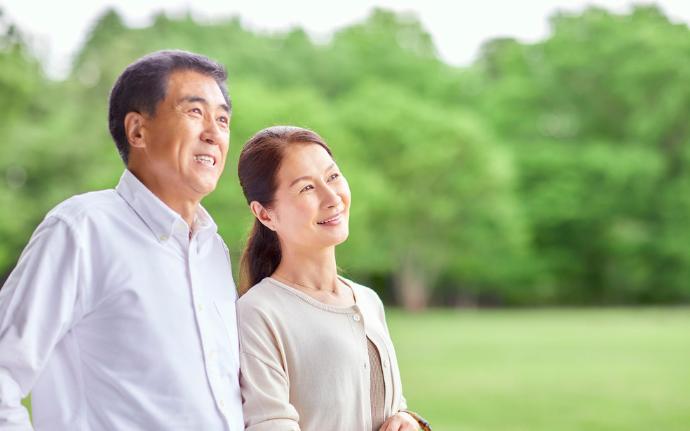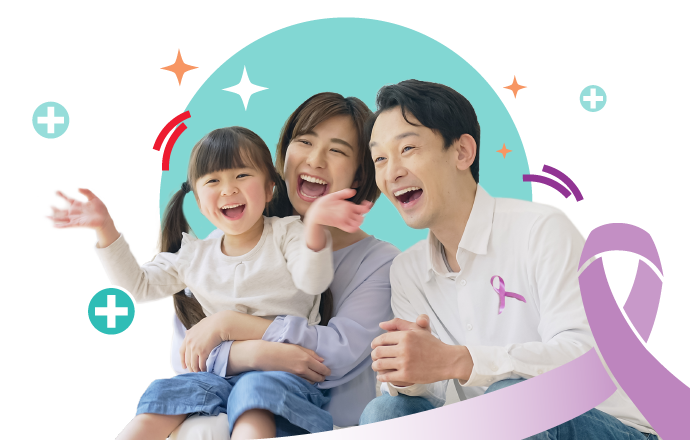Singaporeans are generally aware that cancer is a serious and long-term health condition. However, the prevalence of cancer information on the internet, social media and messaging platforms also makes it one of the most misunderstood illnesses. As we try to protect ourselves from cancer, are we unwittingly overdoing things or doing the wrong thing altogether?
Cancer – a big problem in Singapore
Before we get to the controversial stuff, here are the facts. Cancer is the top cause of death1 among men and women in Singapore. The most common cancers among men are colorectal, prostate and lung cancers. Among women, the most common are breast, colorectal and lung cancers2.
The scale of the problem and the proliferation of cancer advice out there may have prompted us to modify our lifestyle in the name of cancer prevention. Down the road, it may even influence some of our important health and life decisions. While there may be truth in some of the information we’ve come across, is there a chance we’ve been blindsided?
The truth about those things you’ve heard about cancer
I decided to uncover the truth behind some of the things I’ve heard and read about cancer. Why? Because knowledge is power. It could be the difference between being unstoppable in life and stopping all the things you enjoy for nothing. It could also be the difference between life and death. To clear the air on medical-related stuff, Dr Robert Lim, a medical oncologist from Icon Cancer Centre, weighed in with his expert advice.
#1: Eating microwaved and charcoal-grilled food and using mobile phones raises the risk of getting cancer.
Eating microwaved food is a convenience for many busy people. Thankfully, the link between eating microwaved food and cancer risk is just a myth. Dr Lim explains, “There is no scientific evidence that microwave cooking increases the amount of potential carcinogens in foods as compared with conventional cooking.”
When it comes to charcoal-grilled food – which could include our favourite satay and flame-grilled burgers – Dr Lim recommends moderate consumption. “Eating food that’s cooked over an open flame may expose you to DNA-altering carcinogens if the meat has been over-charred. However, further research is needed. A study published in 2015 showed that meat cooked over charcoal or an electric/gas grill did not have clear positive associations to colorectal cancer.”
As for the supposed link between cancer and using mobile phones, which some people keep either on their person or within close reach 24/7, there’s no evidence to support this based on existing research. Dr Lim says, “Mobile phones emit low-range radiofrequencies which are non-ionising and hence do not cause DNA damage. Studies in animals showed no evidence that the radiofrequency radiation increased cancer risk. However in 2011, the International Agency for Research on Cancer classified mobile phones as possibly carcinogenic to humans due to limited evidence from human studies.”
If you’re particularly concerned about radiation exposure to the head, reserve mobile phone use for shorter calls or when a landline phone isn’t available, and use wired or wireless headsets which create more distance between a user’s head and the phone.
#2: Once you’re treated for cancer, you can’t get it again.
This is a common myth. While there have been great advancements in cancer treatments, there is still no cure for cancer when it is advanced or metastatic. Even after cancer has gone away and treatment is no longer needed, cancer can recur.
Dr Lim explains the need to remain vigilant even after cancer treatment: “There is a possibility that cancer may recur and this is why regular follow-up and monitoring is still required after a patient recovers from cancer.”
Generally, however, the longer a person has been cancer-free or “in remission”, the more likely it is that the cancer will not return.
#3: A tumour biopsy or cancer surgery will cause the cancer to spread in the body.
It’s a scary thought but according to Dr Lim, this is untrue. “Many people think that the needle inserted during biopsy will dislodge and spread the cancer cells. However, a BJU International study conducted in 2015 suggests that there is a less than 1% chance that this will occur,” he says.
As for the possibility of cancer spread during surgery, he says, “It is extremely unlikely for cancer to spread during surgery as standard procedures are closely followed.”
#4: No one in my family has had cancer so I’ll never get it.
While the risk of getting cancer does increase for someone with family history of it, this doesn’t mean that individuals with no family history of cancer will never get it. There are individuals who’ve been diagnosed with cancer even though they’ve always led a healthy life and none of their family members have had cancer before.
#5: Herbal medicines can cure cancer.
While more and more people are turning to herbal remedies for various ailments, the fact is that herbal medicines can’t cure cancer. Dr Lim says, “It has not been scientifically proven that herbal medicines can cure cancer although certain traditional Chinese medicines have been known to alleviate some side effects of cancer treatments.”
#6: Only smokers get lung cancer.
Smoking has long been linked with lung cancer, which is the second most common cancer in Singapore2, so it’s easy to think that only smokers get lung cancer. However, this is false. According to a study by the National Cancer Centre Singapore, people who have never smoked in their lives make up 30 per cent of lung cancer patients, and the incidence is rising.
Dr Lim explains: “Non-smokers can get lung cancer too. Although smoking is the highest risk factor for lung cancer, there are other risk factors, such as exposure to asbestos which is traditionally used in building materials, having a medical history of lung disease such as emphysema or fibrosis of the lung, and age – most lung cancers are diagnosed in people over the age of 60.”
So, aside from not smoking and minimising exposure to smoke, asbestos and other toxins, it’s important to maintain a healthy lifestyle and go for regular health checks as lung cancer is unpredictable and doesn’t only affect specific groups of people.
#7: Make-up, hair dyes and roll-on antiperspirants cause cancer.
Untrue. Dr Lim shares, “Many people think that ingredients in cosmetics such as talc or talcum powder and paraben cause cancer. However, there is little to no conclusive evidence to support these claims. Some of the ingredients used in these products have been found toxic in large amounts, but the amount used in cosmetics is much smaller than what’s been shown to cause illness in studies.
“Meanwhile, hair dyes were previously known to contain many carcinogenic ingredients such as aromatic amines, but some of these ingredients were removed in the 1970s. Additionally, hair dyes have not been classified to cause cancer due to the lack of studies in humans,” he says.
As for roll-on antiperspirants, there’s been speculation that because they’re applied close to the breast area, they could cause breast cancer due to possibly harmful ingredients. However, Dr Lim says the few studies that have been conducted to assess this show no correlation between antiperspirants and cancer.
#8: Skipping sunscreen can cause cancer.
This is actually true, so don’t head outdoors without slathering on sunscreen first. “Most skin cancers are caused by prolonged exposure to the sun’s UV rays which can damage skin cells. About 90% of non-melanoma skin cancer cases are caused by exposure to UV radiation,” Dr Lim explains.
To protect yourself from both UVA and UVB rays, he advises applying a broad-spectrum sunscreen. Using sunscreen with SPF15 daily can reduce the risk of getting non-melanoma skin cancer by 40%.
#9: If I’m not in pain, I can’t be having cancer.
Some patients are surprised when they find out they have cancer because they feel relatively normal and pain-free. Early-stage cancer is often painless and while it’s common for people to ignore seemingly insignificant and painless symptoms like fatigue, weight loss, changes in bowel habits or appetite loss, these could all be signs of early-stage cancer or another health condition. So, if you notice a change in your health, especially if it doesn’t go away or gets worse, see a doctor, even if you’re not in pain.
#10: You can’t prevent it, so why make your life difficult with cancer dos and don’ts.
It’s true that no one is immune to cancer, or any other illness for that matter – even if they keep fit and don’t have family history of cancer. However, protecting your health by eating right and maintaining an active and healthy lifestyle does lower your risk of getting cancer. Going for regular cancer screening also helps with early cancer detection, and treating cancer at an early stage usually means better outcomes.
#11: Superfoods like green tea and berries can prevent cancer.
Scientific evidence shows that green tea and certain fruits and vegetables have high levels of antioxidants – compounds which neutralise the harmful effects of free radicals in the body which can contribute to the development of cancer and other health conditions – so they do offer some protection. However, there’s no such thing as a cancer miracle food. So, as you load up on berries, green tea and veggies like broccoli for their all their goodness, remember to consume them as part of a nutritious and balanced diet so you don’t miss out on other nutrients your body needs to function optimally.
#12: Cancer is a death sentence.
With the right treatment, many patients who are diagnosed with cancer go on to have fulfilling lives right into old age. What’s assuring is that more people have gone on to live for at least five years after a cancer diagnosis. The five-year survival period for cancer increased markedly from 13.2% during the 1973-1977 period to 54.3% during the 2016-2020 period for males and from 28.0% to 62.7% for females over the same five-year periods2. This is due to vast advancements in cancer detection and treatment.
Staying in control despite the threat of cancer
Medical advancements mean that cancer treatments will continue to get better and increase survival rates. This gives people hope that they can bounce back from the illness and do the things they want in life. However, I’m also aware that the cost of cancer drug treatments and services can be prohibitive with inflation for medical treatment in Singapore at 10% and that for cancer treatment probably higher. That’s why it’s important to be well covered.
What’s reassuring is that I can now enhance my medical and financial coverage for cancer drug treatments worldwide with a new cancer insurance plan in Singapore, so if I’m ever diagnosed with cancer, I can get the treatment I need without worrying about the cost.
Notes
1. Source: Ministry of Health, Principal Causes of Death, accessed on 3 April 2023.
2. Source: Health Promotion Board, National Registry of Diseases Office, “Singapore Cancer Registry Annual Report 2020”, 23 December 2022.





